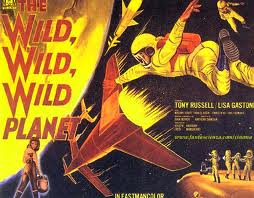 One of my favorite pastimes is watching bad sci-fi/monster movies. “Bad” usually means something from Japan featuring rubber monsters duking it out in downtown Tokyo, but another sure source of unintentional humor is something from Italy. The Italians have made some incredibly awful movies. I’m not talking Fellini or Visconti, but badly dubbed/badly translated garbage like the one I watched the other night, The Wild, Wild Planet
One of my favorite pastimes is watching bad sci-fi/monster movies. “Bad” usually means something from Japan featuring rubber monsters duking it out in downtown Tokyo, but another sure source of unintentional humor is something from Italy. The Italians have made some incredibly awful movies. I’m not talking Fellini or Visconti, but badly dubbed/badly translated garbage like the one I watched the other night, The Wild, Wild Planet
There’s no need to spend two hours watching this movie; you’ve just seen it. Believe it or not, this movie was part of a series of four really crummy space-horror movies. I wonder how many people the producer conned to get the money to make these abominations. But I digress. The point of watching them in the first place is for the hilariously incomprehensible plots, over-the-top acting, cheesy special effects, and most especially the dialogue. (And before you ask, yes, I’m a big fan of MST3K).
As far as types of writing, my hierarchy of difficulty, going from hardest to easiest, is poetry, screen plays/stage plays, fiction, non-fiction, self-help books, travel guides, vampire-romance novels, cooking recipes, and Fifty Shades of Grey. Creating a screen play is high on the difficulty scale because, like stage plays, it requires the author to think about how the thing will be staged as well as all the usual considerations necessary for telling a good story. When a writer has to deal with translating from one language to another, that’s where the fun begins. Take this movie as an example. In one scene at the beginning of the film, the sinister, bronze lamé clad villain is introduced to the leonine space commander—they always look like that, you know. The impeccably coiffed commander asks him about his experiments, and the villain suavely affirms, that yes, “it is my area of expiration.”
Delightful! I giggled for quite a while over that one, and it was just one of many memorable lines of lazily edited dialogue. One has to imagine that the producer and director honestly set out to make a good film. Well, I’ll give them the benefit of a doubt. I bet if you asked Ed Wood about his movies, he would tell you that he poured his heart and soul into them. Mr. Wood famously—or infamously—produced, wrote, directed and even starred in his films. As bad as they are—Plan 9 from Outer Space is a preeminent example—there is a certain honesty to them that is missing in trash like The Wild, Wild Planet. I suspect that the honesty emanates from that simple fact that Mr. Wood was doing the best he could, filling in for lack of talent with sheer enthusiasm. Although, far be it from me to criticize, since I’ve never made a film myself and wouldn’t know where to start if I did.
Still, every time I watch one of these films, along with the guffaws, I also receive a cautionary message: A writer must never be lazy in his story-telling. Research, dialogue, setting, and action must be accurate as well as compelling. The writer must also be true to the story at all times. Anachronisms, feeble plot points, thin characters, and most of all, lazy editing, steal from what might otherwise be an excellent concept. There is so much to see and read out there. Life is too short to spend it reading and viewing crap. God help me to remember this!
